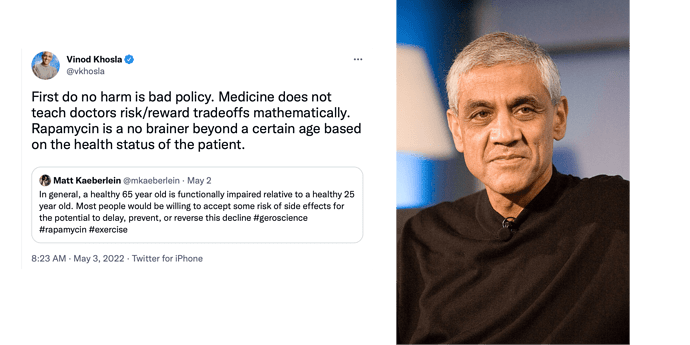no-brain·er
INFORMAL
noun: no-brainer; plural noun: no-brainers
- Something that requires or involves little or no mental effort.
- An easy or obvious conclusion, decision, solution, task, etc.; something requiring little or no thought.
While there are many tech entrepreneurs and longevity experts who are enthusiastic about rapamycin (including Tim Ferriss, Kevin Rose, Brian Armstrong of Coinbase, Peter Diamandis, David Sinclair and Peter Attia and other health and longevity experts), this is the first we’ve heard from Vinod Khosla and his very positive assessment of people’s use of rapamycin.
Vinod’s position on rapamycin is important for a few reasons:
-
Over the past four decades Vinod has repeatedly shown he’s an extremely astute evaluator of risk / reward. First he was a co-founder of Sun Microsystems and helped grow that company into a multibillion dollar business. Then Vinod joined Kleiner Perkins, the legendary venture capital company, and still later started his own VC firm (Khosla Ventures) which has grown into a significant and successful force in the industry, in the process increasing his net worth to an estimated $6.5 Billion according to Forbes magazine.
-
He is a leading investor in the longevity biotech market, so he and his team are sophisticated and experienced in the issues, pathways and technologies in longevity biology. In the past decade he has increasingly focused on innovative healthcare and biotech startups with investments including BioAge Labs, Loyal, the dog aging company, Fountain Therapeutics, Turn Biotechnologies and Cellino Biotech. And he has the support of an entire team of biology and medical experts so his opinion on rapamycin is likely not something formed from just a cursory review of the literature. His team of bio/medical professionals includes: Alex Morgan, Gwen Cheni, Hesam Motlagh, Jun Jeon, Samir Kaul.
-
He has nothing financial to gain from his support of rapamycin, in fact quite the opposite - his investments in other longevity biotech companies suggests that he would actually be hurt financially if rapamycin (an extremely low-cost, generic medication) is successful in becoming widely adopted, because it makes the adoption of the products by these new longevity biotech companies more difficult (due to greater competition).
-
Lastly, Vinod has increasingly been focused on philanthropy related to health and well-being (recently donating $10 Million towards India’s Covid 19 battle) - so he obviously has considerations beyond just making more money.
I saw Vinod Khosla speak at the Rock Health (San Francisco Digital Health Startup Incubator) conference in 2012 - he has an extremely refreshing view on the healthcare and biotech markets, and innovation in this area. I encourage you to watch this video to better understand where he’s coming from. As he says, “Innovation starts on the fringes…” and right now, rapamycin is on the fringes. But in the coming years I expect this fringe to grow into the mainstream, and change the world in the process.
